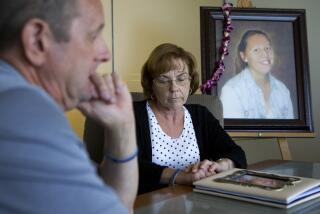Blocking Out the Public
- Share via
When Liberace died nearly 15 months ago, Riverside County Coroner Raymond Carrillo performed an autopsy and announced that, contrary to what the entertainer’s personal physician had reported on his death certificate, the cause of death was an opportunistic form of pneumonia associated with AIDS. Carrillo’s announcement infuriated Liberace’s fans and family, led to a lawsuit against Riverside County and inspired what we regard as an ill-advised attempt to keep death certificates confidential.
A bill sponsored by state Sen. Barry Keene (D-Benicia) would redesign the state’s death certificate, allow the fact of someone’s death to be released but shield from the public all information about the actual cause of death. Access to data on the cause of death would be limited to relatives, state and local health officials, insurance companies and to demographers and epidemiologists who could prove to the state registrar that they had a “valid scientific interest.” Anyone who released such information to an unauthorized person would face a misdemeanor prosecution and up to six months in jail.
The rationale for closing off information that has traditionally been in the public domain is that confidentiality would encourage fuller and more candid reports on the cause of death, especially if someone has died of AIDS or cancer. According to the bill’s sponsor, such diseases are often under-reported because physicians who want to spare surviving family members further anguish write some euphemism on the death certificate. Many public-health officials around the state support the bill because they believe that dissembling by doctors understates the incidence of important diseases and denies them information that they need.
Major gay-rights organizations have not yet taken a position on the bill, though the Senate approved it last September on a hurried 38-0 vote in the final hours of the session, and it now is being studied in the Assembly, along with other AIDS-related legislation. Such groups are sympathetic to the privacy concerns of families that lose loved ones to AIDS but are worried that secrecy would perpetuate the stigma that makes it difficult to discuss the real dimensions of the AIDS menace in a non-judgmental manner.
All the conflicting issues raised by this bill, now dubbed “the Liberace bill,” deserve a fuller discussion than they have received so far in the Legislature. While admitting our self-interest, we would inject one other matter into this debate: the consequences for the news media in withholding death-certificate information. So broad is this bill that it would block media access to information about all causes of death, not just AIDS or cancer. In practice, that would make it far more difficult for a reporter to investigate, say, the incidence of cancer in a town with a chemical plant or the unusually high mortality rates at a hospital where surgeons might be performing operations beyond their skills. And, we acknowledge, when someone prominent dies of AIDS, we would like to report the truth on the obituary page.
In our view this bill, if enacted, will not only stifle enterprising journalism but send a message to the public that there is indeed something shameful about AIDS, something so terrible that this state would ignore the tradition that has made everyone’s cause of death a matter of public record.
More to Read
Sign up for Essential California
The most important California stories and recommendations in your inbox every morning.
You may occasionally receive promotional content from the Los Angeles Times.










